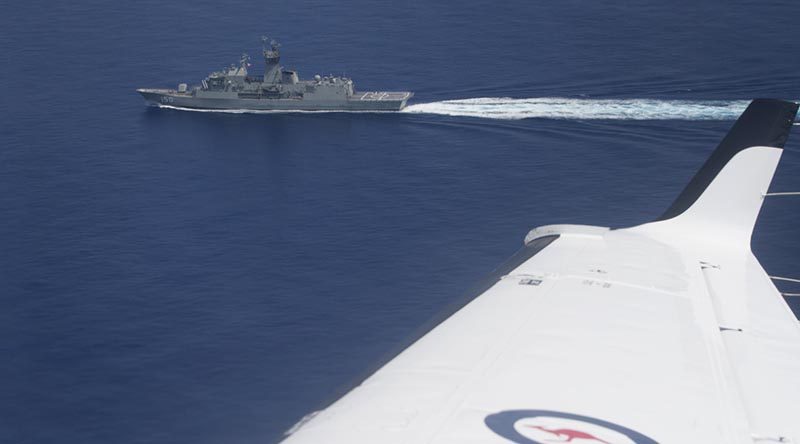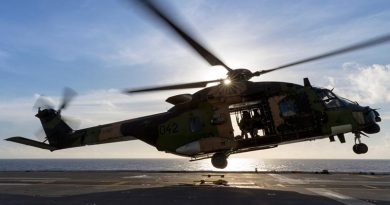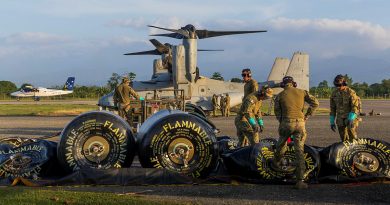Australia’s official stance re South China Sea

TRANSCRIPT – DEFENCE MINISTER MARISE PAYNE ON ABC RADIO NATIONAL BREAKFAST WITH PATRICIA KARVELAS
CAPTION: A Royal Australian Air Force KA350 King Air flies past HMAS Anzac in the South China Sea. Photo by Corporal Steve Duncan
PATRICIA KARVELAS:
As we heard on AM, the Australian Government is in firing line in Beijing. China’s Foreign Ministry has told Australia to stay out of the South China Sea. It says it was shocked by Foreign Minister Julie Bishops assertion that the UN court ruling on the South China Sea territorial dispute was legally binding and that Australia would threaten bilateral relations if it continued with freedom of navigation exercises in the South China Sea. There’s no doubt that regional tensions are ramping up. Joining us now is the Defence Minister Marise Payne. Good morning, Minister.
MINISTER PAYNE:
Good morning, Patricia.
PATRICIA KARVELAS:
How do you respond to this reaction from Beijing?
MINISTER PAYNE:
Well I think the first thing that I would say is that the Foreign Minister, the Prime Minister, and I have made comments that are completely consistent with our historical position. We have said all along that we looked forward to the ruling of the tribunal. Now that we have that ruling, we call on the parties who are involved in that particular negotiation to abide by it. We regard it as final and as binding. We have also consistently called on all claimants in the South China Sea and on South China Sea matters, to operate in accordance with international law.
PATRICIA KARVELAS:
Julie Bishop says Australia will continue freedom of navigation exercises in the South China Sea; are we likely to see Australian planes and ships in the area in coming days or weeks?
Well we don’t comment on future activities of the ADF publically, as you can understand, but we have consistently said that we support our own rights and the rights of other parties to operate in accordance with international law with respect to freedom of navigation and freedom of overflight. Of course, the position we take is that- we’ll demonstrate our own commitment to those aspects in a manner of our own choosing and in a manner that serves both Australian and our regional interests. The South China Sea area, as you know and as your listeners know, is extremely important to Australia and to the region; important to us in terms of the movement of trade in particular. And the tribunal ruling provides us with a very clear decision in accordance with the law of the sea, about maritime rights in that area and as such we advocate and call for an observation of that ruling.
PATRICIA KARVELAS:
Well Beijing says it’s shocked by Julie Bishops assertion that the UN court ruling on the South China Sea territorial dispute was legally binding. Is it legally binding and what is your message to Beijing that has expressed this shock?
MINISTER PAYNE:
Well my message is the same as the Foreign Ministers which is that the tribunal itself, in the arbitration case was one which was established in accordance to the United Nations Convention on the Law of the Sea. It is a decision that is about that convention and what it does is gives countries a clear framework on how we lawfully use our oceans. In that way we’ve supported the rights of the countries, the Philippines in this case, to use the tribunal process to seek to resolve the dispute it has peacefully in accordance to international law. So across the region and more broadly, the overwhelming majority of observers regard the results of the tribunal as legal and as binding, as does Australia. And we have consistently said, and our position is no different, no different yesterday and today than it was some months ago as the tribunal process has proceeded. So what the Foreign Minister had said, and what I am saying is in fact no surprise to the Chinese Government – it is our consistent position.
PATRICIA KARVELAS:
Earlier this week, Shadow Defence Minister Stephen Conroy had this to say on RN Breakfast:
STEPHEN CONROY:
“Australia should be prepared to demonstrate support for the international rules-based system and if Australia does not then others will take that as a signal that they- Australia aren’t willing to support the ruling of the international laws based system.”
PATRICIA KARVELAS:
The Government accused Senator Conroy of urging an escalation of tensions but was he suggesting anything more than the Government now says that it will do?
MINISTER PAYNE:
The Government has consistently said that we support freedom of navigation, we support freedom of overflight in accordance to international law. But what we are very clear about in relation to this decision is that we should be taking the opportunity of the tribunal ruling to engage in a greater dialogue that is based on a clear statement of maritime rights. This is a time to be easing tensions, a time for reframing from provocative actions or provocative statements that could escalate any tensions and uncertainty in the region. So to that extent I think that we can be far more strategic, far more constructive, and far more sensible in our suggestions and our commentary than perhaps what Senator Conroy has been on this occasion.
PATRICIA KARVELAS:
Senator Conroy says that the Government is being misleading by claiming to conduct freedom of navigation and overflight operations in the South China Sea. He points to these exchanges with Chief of Defence Force, Mark Binskin, in Senate Estimates in February:
SENATOR CONROY:
“Now, does the Australian Defence Force conduct deliberate freedom of navigation and overflight activities as part of Operation Gateway?”
MARK BINSKIN:
“No. As we said, we continue to operate in accordance to international law.”
SENATOR CONROY:
“Have any of our ships transiting through the area conducted deliberate freedom of navigation activities on the South China Sea? I suspect the answer is no to our earlier conversation.”
MARK BINSKIN:
“If your definition of freedom of navigation is inside territorial waters, the answer is no.”
So was Julie Bishop correct when she said in a press conference with the Prime Minister on Wednesday that the Australian Defence Force will continue the international rights of freedom of navigation and freedom of overflight as we have done in the past?
MINISTER PAYNE:
Absolutely correct and I…
PATRICIA KARVELAS:
…but how does that correlate with that answer?
MINISTER PAYNE:
I was sitting beside the Chief of Defence Force in that discussion and listening to Senator Conroy and for students of the Estimate’s Hansard, Senator Conroy and I also engaged in a lengthy discussion on these matters. Patricia, we are very clear about our position on these issues. We will demonstrate our commitment to freedom of navigation or freedom of overflight – whatever it might be – in a manner of our own choosing that serves Australia’s and the regional interests. You would expect that to be the case, we are completely consistent in that regard and the Government is very careful in making these statements to ensure that we are advocating our own operation in accordance to international law as well.
PATRICIA KARVELAS:
If you’re just tuning in to RN Breakfast, my Minister- the Minister that I’m speaking to is the Defence Minister- not my actually specific Minister, you’re the nation’s Minister, Marise Payne.
MARISE PAYNE:
Well yes, for the moment.
PATRICIA KARVELAS:
How would Australia respond if the US asked it to conduct a freedom of navigation operation.
MINISTER PAYNE:
Well we have supported the US’s activities in the past as we do with any of our fellow nations who want to operate in accordance to international law. Our discussions with our partners and allies are ongoing. I’m not going to make commentary on hypothetical suggestions in a discussion like this, Patricia. But the most important thing is that, as we have seen what is an extremely detailed, comprehensive decision by the tribunal, we take that final decision, that we seek to encourage the parties to that to abide by it and that we seek to encourage all of the parties in the region to re-engage in the dialogue that is constructive, that eases tensions, and that doesn’t pursue provocative actions that could escalate any tensions or uncertainty in the region..
.
.
.
.
.
.
.

.
.









Pussyfooting around..You know we’ll be fighting them.. diplomacy doesn’t work here..China has made it quite clear and will back it with military might if need be.. If the the Filopinos make moves to occupy or blockade China’s interests in the South China Sea and China retaliates, will SEATO stand and deliver????? NATO didn’t in the Ukraine..